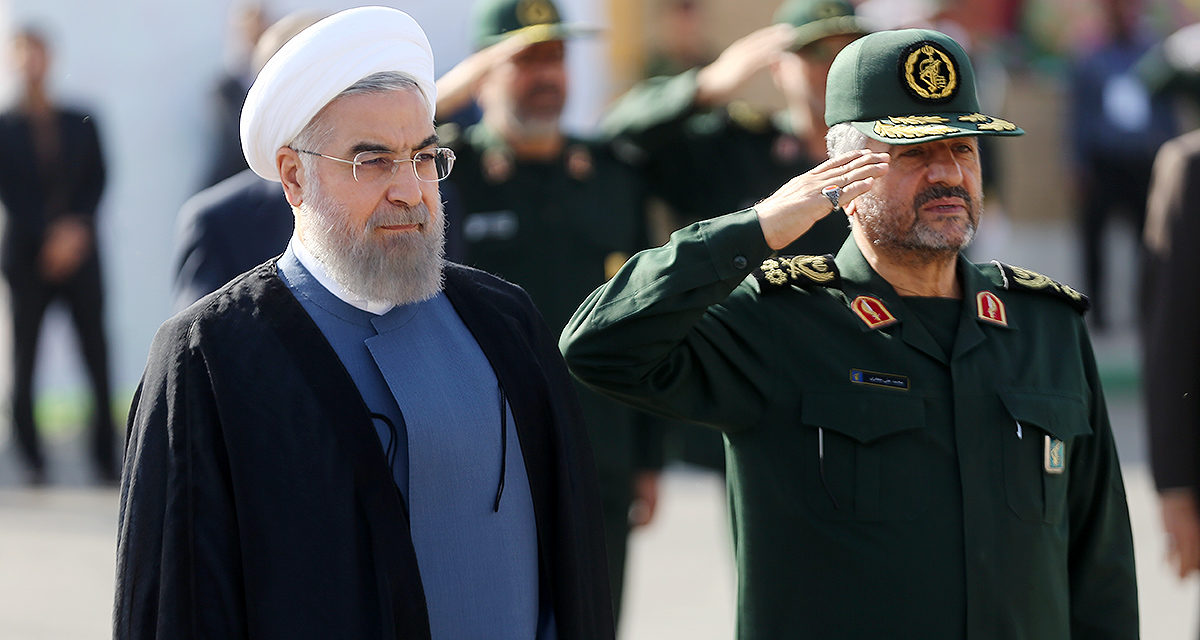PHOTO: President Rouhani and the head of the Revolutionary Guards, General Mohammad Ali Jafari, on Tuesday
Waging a battle for political influence within Iran’s regime, President Rouhani has told his critics that he is needed for the Islamic Republic’s economic recovery.
Rouhani put out the message in a direct approach to some of his most powerful adversaries, addressing senior Revolutionary Guards commanders on Tuesday.
The President made a call for unity, “Safeguarding the Islamic Revolution is only possible if we stand together, cooperate and add to each other’s work. No one should consider himself separate from others.”
Then, while cloaking his challenge in the claim that “unity” had resisted US-led sanctions, he played his trump card of economic competence:
We are not saying it’s possible to get rid of the great powers’ unjust sanctions overnight, but through steadfastness and resistance, we managed to organize it due to the nation’s effort, the Armed Forces’ courage and the brave leader’s guidance.
In defending the country, it’s not enough to rely solely on either diplomacy or military force and only either soft or hard power. In order to achieve success and victory, we must be together and utilize all sources of power. God loves those who engage as a united front in holy war. Whenever we were more unified, we were more victorious.
The government is asking the Armed Forces for help in execution of the resistance economy.
Since the July 14 nuclear deal with the 5+1 Powers,, Rouhani and allies such as former President Hashemi Rafsanjani have tried to build their position with a series of maneuvers and approaches to other factions in the regime. Preparing for February’s elections for Parliament and the Assembly of Experts, the President has called for the removal of the Guardian Council’s power to vet and disqualify candidates.
The Government is also facing an effort by opponents of the nuclear deal to undermine it, notably through a formal vote in Parliament on the agreement.
While the deal still appears likely to proceed, Rouhani suffered a setback last week when the Supreme Leader rejected his attempt to curb the Guardian Council.
On Tuesday, Rouhani — aware of concerns in the Revolutionary Guards about threats to their economic holdings from post-deal foreign investment — responded:
Just as the country has managed to create a military deterrence that makes the enemies not even think of attacking Iran, we must also reach a degree of [economic] deterrence which would make the enemy feel that sanctioning and refusing to cooperate with Iran in the economic field harms them.
As the children of the nation, the Guards, the Basij, the Army and the Law Enforcement Forces must help the government and the people in production, development and economic growth.
The resistance economy fundamentally aims at mobilizing the capacities of all institutions and forces of the regime.
Since his inauguration in August 2013, Rouhani has repeatedly pointed to the necessity for his Government to rebuild Iran’s economy after the mismanagement and corruption that marked the Ahmadinejad Government from 2005 to 2013. An inflation rate of more than 40% has been reduced to less than 14%, and Iran’s GDP is growing at about 3% after a loss of almost 6% in 2013.
In September 2013, Rouhani played the economic card to get the Supreme Leader’s assent to renewed nuclear negotiations, warning of economic collapse if there was no progress towards a deal.
However, in a sign of the ongoing political battle, Tehran Mayor Mohammad-Baqer Qalibaf — who stood against Rouhani in the 2013 election — challenged the President over the economy on Tuesday.
Qalibaf criticized the “non-implementation of the Supreme Leader’s guidelines” for the “Resistance Economy”. He said Ayatollah Khamenei’s goals could be achieved “if the culture of sacrifice and martyrdom were running through various administrative levels of the country”.

